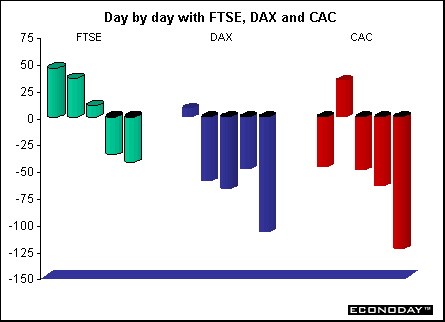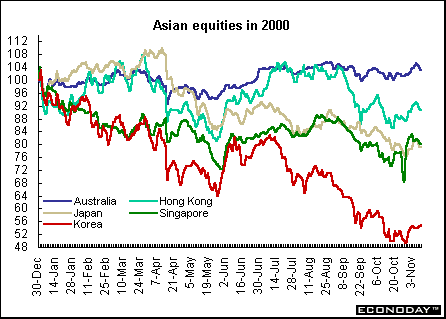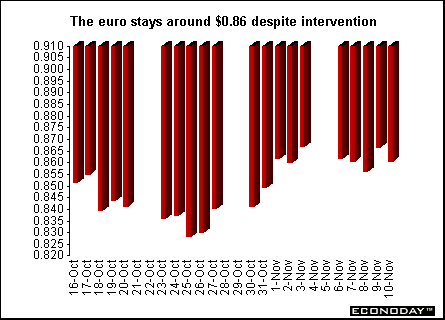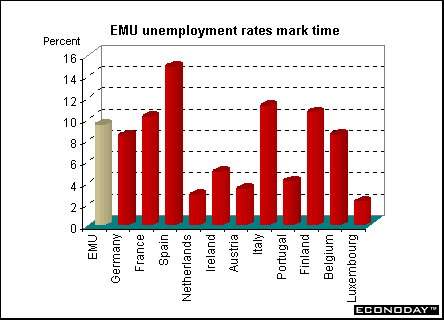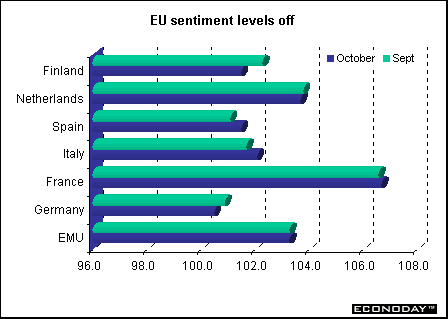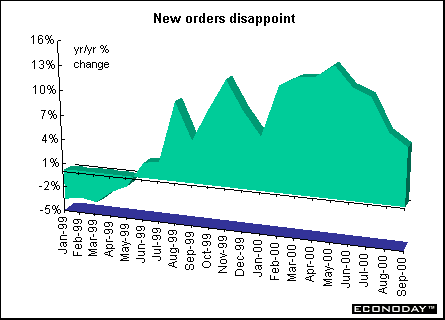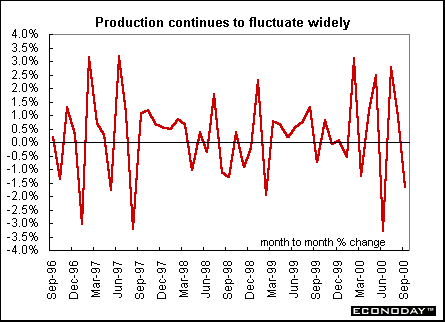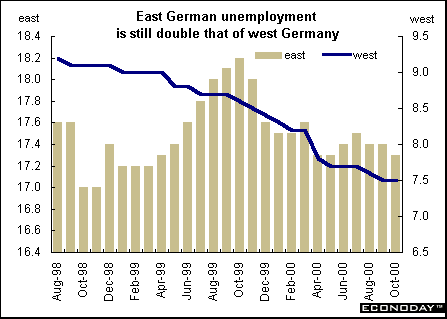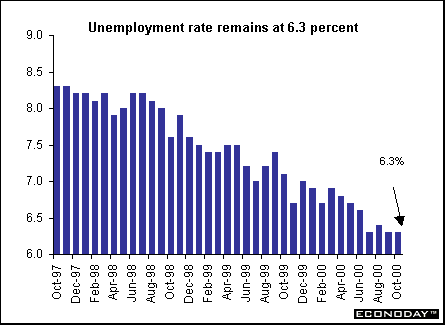| Previous Articles |
|
But future earnings projections worry investors more... Equities had already given back some of the previous week's hard earned gains on worries that slowing economic growth would impact earnings negatively. Technology and media stocks were particularly hard hit when key companies, such as Dell, met third quarter profits estimates but warned of slower future growth. The stalemate in the presidential election only exacerbated investor worries. To add to the list of uncertainties, OPEC has begun discussions on spring production quotas and the impact that slower world growth may have on crude oil supplies. Talk is of production cutbacks. OPEC is fearful that slower worldwide growth will result in another oil glut and plummeting prices. And with the Middle East still explosive, crude oil prices rose above $34 per barrel once again.
Europe and Britain
British markets were cautious as the week began - a reflection of two important events of the week - the outcome of the U.S. presidential election and the chancellor of the exchequer's pre-budget statement. With the U.S. election result up in the air, dealers turned their attention to chancellor Gordon Brown, hoping for a decisive speech. But the speech contained no real surprises with fiscal risks seemingly averted. There was little to worry the bond markets or the Bank of England. As expected, the Bank of England's monetary policy committee decided on Thursday to leave domestic interest rates unchanged for the ninth consecutive month. On the week, the FTSE 100 managed barely to keep its head above water, rising 14.80 points or 0.23 percent to 6400.20. Uncertainty surrounding the U.S. presidential election, a jittery euro and a steady drip of bad news on corporate profits eroded European equities indexes. Both Frankfurt and Paris ended the week with net losses. The DAX lost 276.58 points or 3.88 percent to close at 6851.69 while the CAC lost 251.43 points or 3.88 percent to end at 6147.49. Asia
In South Korea, Daewoo, after a monumental struggle, finally went bankrupt when unions would not agree to labor cutbacks. Creditors drew the line, and the company was forced to close down operations Friday because of a lack of auto parts. This in turn puts the possible merger with GM in jeopardy. On Friday, the Bank of Japan's monetary policy committee will meet. Policy is expected to remain unchanged given Japan's faltering growth. More large scale bankruptcies are expected. There are few, if any, economic indicators to offer investors guidance. Therefore investors will look elsewhere for economic trends, i.e. the United States. On the week, only the Nikkei and South Korean Kospi finished on the plus side. However, the Hong Kong Hang Seng fell on worries that slowing U.S. growth will hurt demand for their chips and computer parts. Telecommunications and computer related stocks fell when Dell said sales growth will slow in the next fiscal year. Asia supplies most of the components for U.S. companies. Currencies
In their monthly report, the ECB indicated a more neutral and less hawkish monetary policy stance while emphasizing that controlling inflation remains their primary goal. They pointed to potential problems in maintaining price stability - the continued weak euro and potential for excessive wage increases next year. The ECB is treading a cautious line given signs of weakening economic growth especially in the EMU's largest economy, Germany, and inflation emanating from the weak euro and high crude oil prices. As evidence accumulates that the EMU economy is slowing, the region's finance ministers are likely to prefer that the ECB intervene in the foreign exchange markets to check the inflationary risks posed by the euro's depreciation rather than raise interest rates and perhaps crimp growth even more. Despite the undecided presidential election, the dollar was little affected by the uncertainty and the euro ended Friday below the previous week's close. The fact that the euro has been unable to benefit from the political chaos in the United States, let alone from the ECB's repeated intervention, illustrates that there is still deep rooted negative sentiment toward the currency. Yet unilateral intervention does have its benefits. One positive aspect is that it keeps the market jittery about repeated intervention in the short term. And the ECB can feel free to buy euros at will, unfettered by coordinating the timing of policy action with the other central banks. Indicator scoreboard September industrial producer prices - excluding construction - jumped 0.9 percent and 6.2 percent when compared with last year due to higher oil prices. September seasonally adjusted unemployment rate fell to 9.0 percent from a revised 9.1 percent rate in August. Of the nine EMU states reporting data, unemployment fell in four countries while it remained unchanged in five. Spain continues to show the highest unemployment rate, 14.4 percent.
EU - October European Commission economic sentiment index was steady after being revised up in September. An unexpected rise in industrial confidence offset flat consumer confidence and a drop in equity prices. These data are at odds with other EMU and national indicators, which suggest a slowdown in growth in the period ahead.
Germany - September preliminary manufacturing orders sank 4.6 percent. Every demand category - both foreign and domestic - declined in September. Foreign demand fell 6.2 percent after a 2.9 percent increase in August. Foreign capital goods demand plunged 11.4 percent, while foreign intermediate goods orders fell 2.9 percent. Durable and non-durable consumer goods demand was down 0.9 percent. Domestic orders also fell, down 3.2 percent after a 1.2 percent August increase. Capital goods orders were down 5.5 percent, domestic durable and consumer goods demand was down 4.7 percent and intermediate goods orders fell 1.5 percent on the month. Manufacturing orders showed large divergences between east and west Germany with west German orders falling 5.0 percent while they rose 0.6 percent in the east.
September pan-German industrial production declined 1.6 percent, backing other evidence of a slowdown in the EMU's largest economy. Output declined in both west Germany (down 1.7 percent) and in east Germany (down 3.5 percent). Output declined across the board, with only utilities showing a rise in output during the month. Third quarter production remained strong, up 1.4 percent when compared with the second quarter.
September real wholesale sales slipped 0.4 percent but were up 7.1 percent when compared with last year. September's decline was mainly due to falling sales for raw materials - including oil products - and food, beverages and tobacco. Durable and non-durable consumer goods sales were up a strong 12.0 percent in real terms. September seasonally adjusted unemployment rate fell to 9 percent but the pace of non-farm payroll jobs growth slowed sharply during the summer. West German seasonally adjusted unemployment declined for the 16th straight month. East German seasonally adjusted unemployment, on the other hand, decreased for the first time since May, after having risen in three out of the previous four months.
October seasonally adjusted consumer price index remained unchanged and was up 2.4 percent when compared with a year ago. Excluding energy prices, consumer prices rose 0.2 percent on the month and 1.0 percent when compared with last year. The final October unadjusted consumer price index fell 0.2 percent and rose 2.4 percent from October 1999 levels. September nominal seasonally adjusted merchandise trade surplus was E3.8 billion, down from an E4.0 billion surplus in August and down from E5.6 billion surplus in September 1999. The unadjusted trade surplus fell to E3.7 billion from E5.7 billion in September 1999. Exports adjusted for seasonal variations but not for price differences, fell 1.2 percent on the month but were up 17.1 percent on the year. Imports were down 0.8 percent on the month and up 24.5 percent on the year. Britain -September industrial output fell 1.1 percent but was up 0.8 percent when compared with last year. Production suffered because of lower oil output as a number of oil fields were closed for maintenance. Energy supply industries also posted lower output because of warmer than usual weather. Production in the third quarter is estimated to have risen by 0.6 percent on the quarter and by 1.3 percent when compared with last year. Manufacturing output fell 0.4 percent on the month but is still 0.6 percent higher than a year earlier. In the three months to September manufacturing output rose 0.6 percent and was up 0.9 percent on the year. International Energy Agency - The IEA shifted some expected global oil demand from the fourth quarter this year to the first quarter next year, but warned that low inventories risked spot product shortages this winter. OECD industry stocks fell by an estimated 400,000 barrels per day in September in response to stronger demand. Stocks typically rise in the third quarter, but this year's increase of less than 100,000 barrels per day is lower than average and starts from a much reduced base. Unless stocks are built in advance of peak demand, regional supply imbalances are inevitable, as was the case with gasoline last summer and heating oil this winter. Asia Australia - October unemployment rate remained at a ten year low of 6.3 percent. However, the number of jobs fell by 5,100. The number of job vacancies advertised in Australian newspapers rose 11.8 percent in October but fell 17.4 percent on the year, according to an ANZ Bank survey.
BOTTOM LINE None of the three central banks are expected to change interest rate policy at their meetings this week. But the policy statements issued by the Federal Reserve, Bank of Japan and the European Central Bank will be dissected for any change in inflection or emphasis. In Britain, a number of market moving economic indicators along with the Bank of England's latest inflation report will be released, and the markets will use them to help measure the economy's pulse. Finally, until there is closure to the U.S. election, investors are bound to tread carefully.
Release dates are subject
to change. |
|||||||||||||||||||||||||||||||||||||||||||||||||||||||||||||||||||||||||||||||||||||||||||||||||||||||||||||||||||||||||||||||||||||||||||||||||||||||||||||||||||||||||||||||||||||||||||||||||||||||||||||||||||||||||||||||
